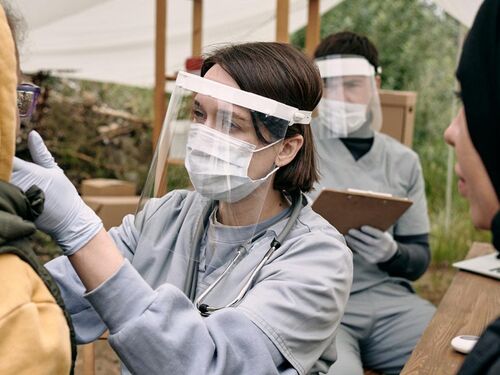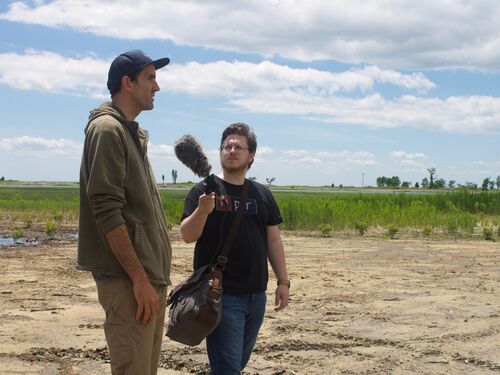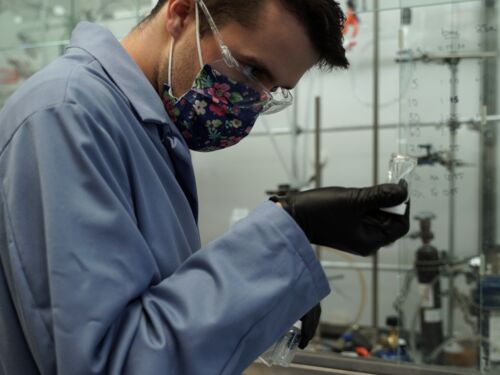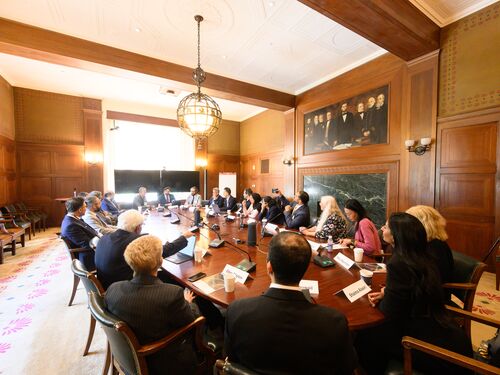Violence Against Health Workers During War
Feature Story
By Sara Frueh
Last update October 26, 2021
Discussion Explores an Often Overlooked Global Problem
Recognition of the need to protect health care workers and wounded soldiers in combat zones is the oldest requirement of the Geneva Conventions — the international agreements on the rules of war that date back to 1864.
Despite this long-standing recognition — and rules that have gotten stronger over time — the violence continues, explained Leonard Rubenstein, a professor at Johns Hopkins University School of Public Health, and author of Perilous Medicine: The Struggle to Protect Health Care from the Violence of War.
From 2016 to 2020 there were more than 4,000 violent incidents against health care workers and facilities during conflicts — which works out, on average, to a health facility being attacked and damaged or destroyed every other day, and a health worker killed every three days.
Yet the problem has not been high on the global health agenda, said Rubenstein, who spoke at a recent webinar hosted by the National Academies’ Committee on Human Rights. “Despite this long tradition of affirmation of the need for protection, and [despite] the violence, it’s not a very well-known issue,” he said. “We have this enormous level of violence, and very little attention is paid.”
Rubenstein was joined in the discussion by Joanne Liu, former international president of Médecins Sans Frontières (MSF), and moderator Robert Lawrence of the Johns Hopkins Bloomberg School of Public Health, who is a member of the National Academy of Medicine.
“Anyone who is sick and who is fighting for his life shouldn’t have a bomb going off over their head when they are in the ICU,” said Liu. “[And] when a hospital is attacked, it deprives a huge amount of people of health care.”
Rubenstein offered examples of the damaging downstream effects of these attacks: In Yemen, the Saudi bombing of health infrastructure and systems, including hospitals, led to the largest cholera epidemic the world has ever seen — more than 2 million cases, he said. And attacks on health care workers in the Democratic Republic of the Congo hindered efforts to bring the region’s most recent Ebola outbreak under control for a year and a half.
“The consequences for global health of this violence are extraordinary,” said Rubenstein.
What drives and sustains the violence
What motivates violence against health care workers and hospitals? Combatants sometimes have strategic reasons for these attacks — for example, to displace populations, or to discourage populations from supporting their enemies, said Rubenstein. They may have tactical reasons, such as a demand for priority treatment for their own fighters, or finding a hospital a useful place from which to attack or to store weapons.
Liu pointed to declining levels of protection. “I think over the years there has been an erosion in the responsibility of the hosting community in protecting the workers and the health care facilities.”
Part of the problem lies in domestic counterterrorism laws that sometimes forbid or criminalize health care workers’ efforts to help certain patients, explained Liu. In 2012, for example, Syria’s president decided that anyone working on the opposition side was “supporting terrorism” — which effectively offered license to attack health care providers. “We basically are attacked openly when we don’t fit the agenda of … state groups or non-state groups,” said Liu.
And when violence happens, perpetrators are rarely held to account, said Rubenstein. “The problem of impunity is one of the most serious challenges in this area,” he said. “There is almost no accountability for any of the attacks.”

Because these attacks are often in violation of domestic military law, there are court martial procedures that could be used, but they are almost never invoked, Rubenstein said. And on the global level there’s been paralysis because of the structure of the U.N., which allows the Security Council to veto referrals to the International Criminal Court. Major powers also use their authority and their political clout to stop even the mildest form of accountability, he said.
We need a countervailing force to ensure accountability, Rubenstein said, but we also need governments who claim to be committed to the laws of war to act on those commitments.
The need for advocacy and action
Both speakers pointed to the need for the broader global health care community to get more involved in advocating for the protection of their colleagues working in war zones.
“It’s the medical community and the nursing community and every other health community that should be at the forefront,” said Rubenstein. “There has to be a willingness to mobilize to achieve the political goals that would bring more protection — more accountability, more changes in the law, more political will to stop arms sales to perpetrators.”
As an example of effective mobilization, Rubenstein noted the efforts of the journalism community, which is very outspoken about protection for their peers. “They take out full page ads in newspapers, and they are relentless in trying to protect them,” he said. “There is no equivalent in the health community.”
Liu stressed the need to follow through on statements with practical plans and action. For example, after U.S. airstrikes in 2015 destroyed an MSF hospital in Kunduz, Afghanistan, the U.N. Security Council passed Resolution 2286 for the protection of medical missions in war zones — but the U.N. didn’t follow through by voting on a plan to operationalize the resolution, Liu explained. “Words are cheap,” she said. “You can have the best statements and nicely articulated arguments with passion, but if it’s not followed through with a real operationalization plan, things will be the same.”
Given lack of progress at the international level, MSF often focuses on the national level, trying to negotiate to ensure that domestic law has an exemption for medical aid, so that it is not perceived or criminalized as support to terrorism, said Liu. She also stressed that in making their case, health care workers need to stick to the basic humanitarian principle that all patients deserve care.
“To me, a patient is a patient,” said Liu. “A patient that’s in Kunduz or in Sanaa or in South Sudan is the same … a patient.”
More like this
Discover
Events
Right Now & Next Up
Stay in the loop with can’t-miss sessions, live events, and activities happening over the next two days.
NAS Building Guided Tours Available!
Participate in a one-hour guided tour of the historic National Academy of Sciences building, highlighting its distinctive architecture, renowned artwork, and the intersection of art, science, and culture.




